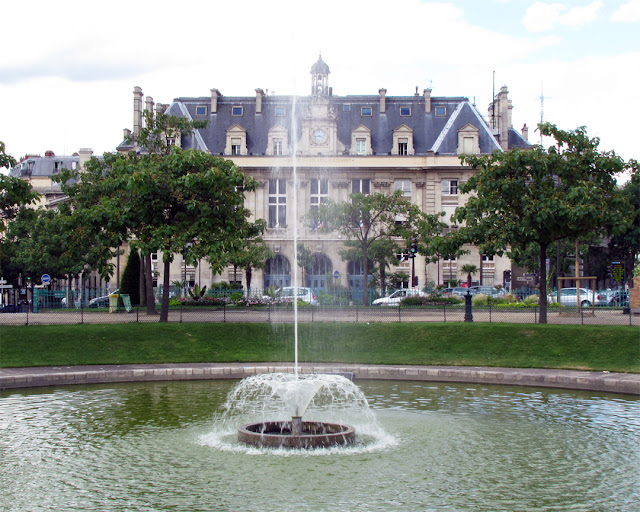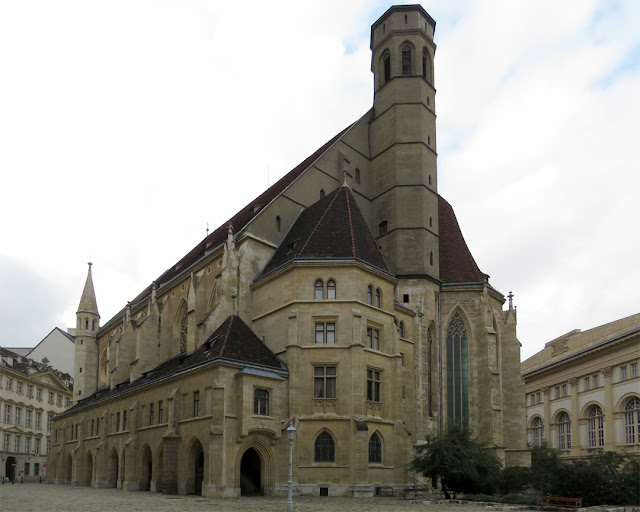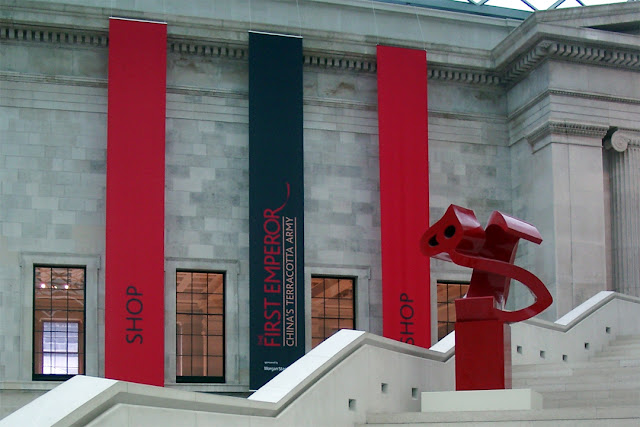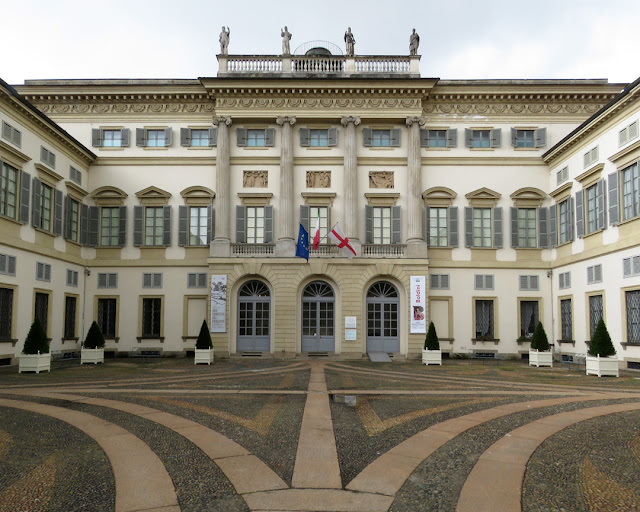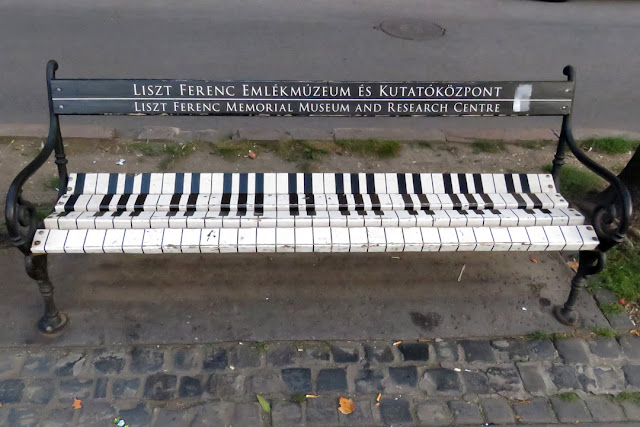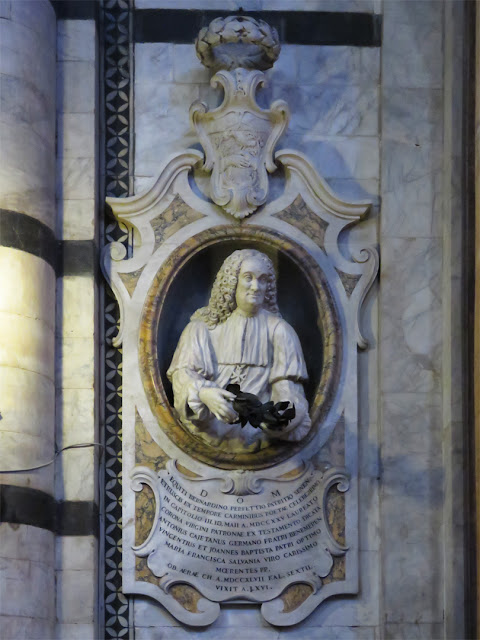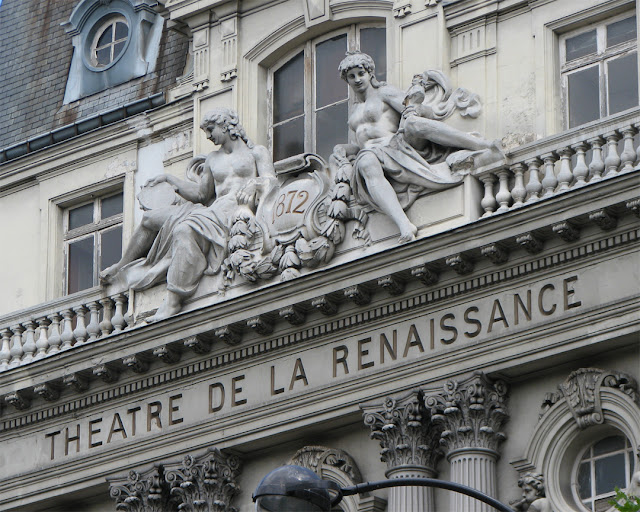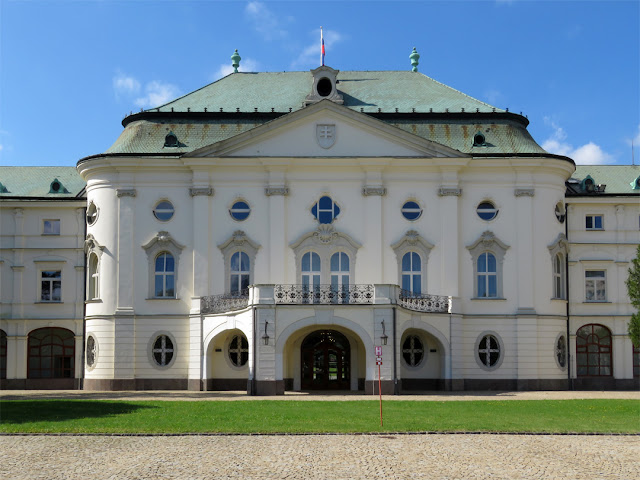Sunday, September 30, 2018
T-34 Model 1942
T-34 Model 1942
Sowjetisches Ehrenmal (Soviet War Memorial)
Straße des 17. Juni, Großer Tiergarten
Berlin, September 2011
“The memorial was built from stonework taken from the destroyed Reich Chancellery. Built in a style similar to other Soviet World War II monuments that were once found all over the former Eastern Bloc, the memorial takes the form of a curved stoa topped by a large statue of a Soviet soldier. It is set in landscaped gardens and flanked by two Red Army ML-20 152mm gun-howitzer artillery pieces and two T-34 tanks. Behind the memorial is an outdoor museum showing photographs of the memorial's construction and giving a guide to other memorials in the Berlin area.” (Soviet War Memorial, Wikipedia)
Saturday, September 29, 2018
Indro Montanelli
Indro Montanelli by Vito Tongiani, 2006
Indro Montanelli Public Gardens
Milan, May 2018
“Indro Alessandro Raffaello Schizogene Montanelli Knight Grand Cross OMRI (22 April 1909 – 22 July 2001) was an Italian journalist and historian. Generally considered one of the greatest Italian journalists of the 20th century, he was among the 50 World Press Freedom Heroes of the previous 50 years named by the International Press Institute in 2000. He distinguished himself for his original approach to writing history in books such as History of the Greeks and History of Rome.” (Indro Montanelli, Wikipedia)
Friday, September 28, 2018
Woman with a Vase
Žena s krčahom (Nymfa) / Woman with a vase (Nymph), 1804
Františkánske námestie
Staré Mesto (Old Town)
Bratislava, September 2017
Thursday, September 27, 2018
Mairie du 13e arrondissement
Mairie du 13e arrondissement
Place d'Italie
Quartier de la Salpêtrière, 13th arrondissement
Paris, July 2010
Wednesday, September 26, 2018
Piccolomini Library
Libreria Piccolomini (Piccolomini Library)
Duomo di Siena (Siena Cathedral)
Piazza del Duomo
Siena, April 2017
Tuesday, September 25, 2018
Monday, September 24, 2018
Red Heech
“Red Heech” by Parviz Tanavoli, 2001
Queen Elizabeth II Great Court
The British Museum
Great Russell Street, Bloomsbury
London, January 2008
“The foremost Iranian artist Parviz Tanavoli was a founder member of ‘Saqqakhaneh’, a term coined for an artistic movement that began in Iran during the 1960s and which sought to integrate popular symbols of Shi'a culture in art - a ‘spiritual Pop Art’, as it has been described. He has long been inspired by the word ‘heech’ - meaning ‘nothing’ - which he has created in numerous and ever more ambitious forms. It has been said that the word symbolises for him both an ambivalence towards the past and a sense of meaninglessness or dissatisfaction with an inadequate present. The letter forms are in the traditional Persian ‘nasta'liq’ script (Porter 2008, 57).” (Red Heech, The British Museum)
Sunday, September 23, 2018
Galleria d'Arte Moderna
Galleria d'Arte Moderna (Modern Art Gallery)
Villa Reale, via Palestro
Milan, May 2018
“The Galleria d'Arte Moderna (Modern Art Gallery) is a modern art museum in Milan, in Lombardy in northern Italy. It is housed in the Villa Reale, at Via Palestro 16, opposite the Giardini Pubblici. The collection consists largely of Italian and European works from the 18th to the 20th centuries. The museum has works by Francesco Filippini, Giuseppe Ferrari, Giovanni Fattori, Silvestro Lega, Giovanni Boldini, Vincent van Gogh, Édouard Manet, Paul Gauguin, Paul Cézanne, Pablo Picasso, Giacomo Balla, Umberto Boccioni, Francesco Hayez, Giovanni Segantini, Giuseppe Pellizza da Volpedo and Antonio Canova, among others. It has received donations from Milanese families including Treves, Ponti, Grassi and Vismara. After the Second World War the twentieth-century works in the collection were moved to the Padiglione d'Arte Contemporanea, built in 1955 on the site of the former stables of the palace, which had been destroyed by wartime bombing.” (Galleria d'Arte Moderna, Wikipedia)
Saturday, September 22, 2018
Liszt Bench
Bench advertising Liszt Ferenc Emlékmúzeum (Ferenc Liszt Memorial Museum)
Andrássy út (Andrássy Avenue)
Budapest, September 2017
Friday, September 21, 2018
Obélisque de la place des Fêtes
Obélisque de la place des Fêtes by Zoltán Zsakó, 1996
Place des Fêtes
Quartier d'Amérique, 19th arrondissement
Paris, July 2005
Thursday, September 20, 2018
Bernardino Perfetti
Monument to Bernardino Perfetti by Bartolomeo and Giuseppe Maria Mazzuoli, 1750
Duomo di Siena (Siena Cathedral)
Piazza del Duomo
Siena, April 2017
Wednesday, September 19, 2018
I Goat
“I Goat” by Kenny Hunter, 2011
Brushfield Street
Spitalfields
London, September 2015
“There's a bearded lady across the road from the Liverpool Street station in Spitalfields parish. Standing atop a pile of concrete crates, she surveys bankers and lawyers rushing to and fro, listens to buskers in the square, and the bells of Christ Church behind her. She is also a goat. ‘I Goat’, a hand-crafted sculpture by Kenny Hunter, was unveiled in 2011. The aluminum farm animal stands atop a tall stack of crates, locked in a proud stance. Nowadays, she’s the only horned creature in the vicinity, but back when King Charles I licensed the sale of flesh, fowl and roots on the site in 1638, Spittle Fields was a bustling trading ground on the outskirts of London. Robert Horner’s market buildings, completed in 1893, still stand, housing restaurants and shops, although the fruit and vegetable market was moved further east to Leyton in 1991.” (I Goat, Atlas Obscura)
Tuesday, September 18, 2018
Monday, September 17, 2018
Giuseppe Verdi
Giuseppe Verdi by Luca Zammarchi
Via Pio IV
Milano, May 2018
“Basilica di San Lorenzo, one of the oldest churches in the city, is among the highlights of the street art tour. Commissioned by local parish, Don Augusto Casolo, who wanted to highlight the difference between vandalism and contemporary art using the church wall for creative purposes rather than meaningless graffiti. He put together a team of outstanding artists, including Mr. Blob, Encs, Gep, Luca Zammarchi and asked them to visualise the past, present and future of Milan.This work of art represents important historic figures like Napoleone Bonaparte, Giuseppe Verdi, Alessandro Manzoni, Leonardo da Vinci as well as events such as conflicts between Sforza and Visconti families and the second world war.” (Milan Street Art, MilanExperienceTours)
Sunday, September 16, 2018
Church of St Francis Seraph
Kostel sv. Františka Serafinského (Church of St Francis Seraph)
Křižovnické náměstí
Staré Město (Old Town)
Prague, September 2017
Saturday, September 15, 2018
Théâtre de la Renaissance
Théâtre de la Renaissance by Charles de Lalande, 1873
Boulevard Saint-Martin
Quartier de la Porte-Saint-Martin, 10th arrondissement
Paris, July 2008
“The name Théâtre de la Renaissance has been used successively for three distinct Parisian theatre companies. The first two companies, which were short-lived enterprises in the 19th century, used the Salle Ventadour, now an office building on the Rue Méhul in the 2nd arrondissement. The current company was founded in 1873, and its much smaller theatre (pictured) was built that same year next to the Porte Saint-Martin at 20 boulevard Saint-Martin, in the 10th arrondissement. Besides performances of musical theatre, Feydeau's farces were first produced in this theatre, and plays by Victorien Sardou. Among the actors who triumphed there were Sarah Bernhardt, Eleonora Duse, and Raimu, later Agnès Jaoui and Jean-Pierre Bacri.” (Théâtre de la Renaissance, Wikipedia)
Friday, September 14, 2018
Cappella della Madonna del Voto
Cappella della Madonna del Voto (Chigi Chapel)
Duomo di Siena (Siena Cathedral)
Piazza del Duomo
Siena, April 2017
“The small Chigi Chapel (or Cappella della Madonna del Voto) is situated in the right transept. It is the last, most luxurious sculptural addition to the Duomo, and was commissioned in 1659 by the Sienese Chigi pope Alexander VII. This circular chapel with a gilded dome was built by the German architect Johann Paul Schor to the baroque designs of Gian Lorenzo Bernini, replacing a 15th-century chapel. At the back of the chapel is the Madonna del Voto (by a follower of Guido da Siena, 13th century), that even today is much venerated and receives each year the homages of the contrade. On the eve of the battle of Montaperti (4 September 1260) against Florence, the city of Siena had dedicated itself to the Madonna. The victory of the Sienese, against all odds, over the much more numerous Florentines was ascribed to her miraculous protection. Two of the four marble sculptures in the niches, are by Bernini himself: Saint Jerome and Mary Magdalene. The other two are Saint Bernardine (Antonio Raggi) and Saint Catherine of Siena (Ercole Ferrata). The eight marble columns are originally from the Lateran Palace in Rome. The bronze gate at the entrance is by Giovanni Artusi.” (Siena Cathedral, Wikipedia)
Thursday, September 13, 2018
Episcopal Summer Palace
Letný arcibiskupský palác (Episcopal Summer Palace)
Námestie slobody
Staré Mesto (Old Town)
Bratislava, September 2017
Wednesday, September 12, 2018
Tuesday, September 11, 2018
Sepulchre of Peter of Verona
Sepulchre of Peter of Verona by Giovanni di Balduccio, 1339
Cappella Portinari (Portinari Chapel)
Basilica of Sant'Eustorgio
Piazza Sant'Eustorgio
Milan, May 2018
“In 1736 the elaborate marble sepulchre of Peter of Verona, commissioned in 1336 from Giovanni di Balduccio (a pupil of Giovanni Pisano), was moved from the basilica into the Portinari Chapel and placed at the back of the apse; the following year a marble altar was erected in front of it, on which was placed the silver shrine containing the saint’s head. In the 1880s the sepulchre, which had been hidden away awkwardly behind the altar, was moved into the main body of the chapel and placed somewhat off-centre, where it would be well lit by the lateral windows, and where it still stands. The head, however, is today conserved in a small adjacent chapel.” (Portinari Chapel, Wikipedia)
Monday, September 10, 2018
Virgen de la Esperanza de Macarena
Virgen de la Esperanza de Macarena (Virgin of Hope of Macarena)
Reitschulgasse
Vienna, September 2017
Sunday, September 9, 2018
Medallion by René Rochard
Medallion by René Rochard, 1954
Monument aux morts du 13e arrondissement
Boulevard Auguste Blanqui / place d'Italie
Quartier de la Maison-Blanche, 13th arrondissement
Paris, July 2010
Saturday, September 8, 2018
Upper Façade Mosaic
“Coronation of the Virgin” by of Luigi Mussini, 1878
Upper façade mosaic
Duomo di Siena (Siena Cathedral)
Piazza del Duomo
Siena, April 2017
Friday, September 7, 2018
Kiskirálylány
Kiskirálylány (Little Princess) by Marton László, 1989
Belgrád rakpart / Vigadó tér
Budapest, September 2017
Thursday, September 6, 2018
Großer Mann mit kleinem Mann
“Großer Mann mit kleinem Mann” (Big Man and Little Man) by Stephan Balkenhol, 1998
Palais am Pariser Platz
Pariser Platz
Berlin, September 2011
Wednesday, September 5, 2018
ATM Class 1500 tramcar
ATM Class 1500 tramcar
Via Alessandro Manzoni
Milan, May 2018
“The ATM Class 1500, also known as type 1928, is a series of tram vehicles used by the ATM on the Milan urban tramway network. In the 1920s, the increasing traffic on the Milan urban tramway network made pressing the substitution of the old tramcars ‘type Edison’. The municipal tram office decided to design a new type of tramcars, built on two bogies, taking as model the Peter Witt streetcars built in Cleveland and in other cities of the United States. The Milan streetcar was projected by the municipal engineers in 1927, and two prototypes, built by Carminati & Toselli and numbered 1501 and 1502, came into service at the end of the same year. After a few tests, the construction of a 500 units stock (numbered 1503 to 2002) began, divided between several manufacturers." (ATM Class 1500, Wikipedia)
Tuesday, September 4, 2018
Notre-Dame de l'Assomption
Notre-Dame de l'Assomption des Buttes Chaumont by Denis Honneger, 1960
Rue de Meaux
Quartier du Combat, 19th arrondissement
Paris, July 2006
Monday, September 3, 2018
Sunday, September 2, 2018
The Siena Rose Window
Vetrata (Rose Window) by Duccio di Buoninsegna, 1288
Duomo di Siena (Siena Cathedral)
Piazza del Duomo
Siena, April 2017
“This magnificent cathedral was built atop an older structure and constructed with layers of alternating stripes of white and greenish-black marble. The four facades of the building each have their own distinctive work and style, and the most impressive of these is the west facade. While the cathedral houses several stained glass windows, including one from the 16th century depicting the Last Supper, it’s the famous Siena Rose window in this west gable that is the most impressive. This stunning window differs from more typical rose windows found in other cathedrals. Most rose windows are crafted with brilliant colors in ornate designs and patterns, brought together in a way that creates a stunning kaleidoscopic effect. Located over the High Altar, the Siena Rose window displays images depicting the Virgin Mary, the Mother of Jesus. Stained glass windows are common in Europe, but were somewhat of a rarity in Italy, especially at this magnitude. Dating back to 1288, this stained glass window is among the oldest in all of Italy. It was crafted by Duccio di Buoninsegna, an outstanding painter of the era. The age and deterioration of this window has caused anxiety for some time. Finally, in 1996, this 18-foot-diameter window was carefully removed in a series of sections and taken across the piazza into another building to undergo a painstaking 3-year conservation project. Due to the importance of this window, the chief restorer ordered a large glass window be installed at the end of his workshop so that the general public could view each phase of his restoration. This allowed the public to see how the work was progressing, allowing them before and after views as sections were completed. Much of the leading that held the stained glass in place was not original. This lead had been replaced during previous restoration phases and was in very poor shape. However, nearly all of the glass was determined to be original. The biggest challenge of the restoration was preserving the brownish paint that the artist used to paint the facial details of the figures. This paint, called grisaille, was applied to the glass and then the pieces were re-baked. Unfortunately, the temperature calculations needed for this type of work had not been perfected in the 13th century. Too high a heat would crack the glass and too low a heat would cause the paint to fail. Some of this grisaille was missing due to natural decay, while other was due to over cleaning in the centuries gone by. Following the restoration efforts, the window was displayed to the general public, allowing a once-in-a-lifetime opportunity to see such a magnificent work up close.” (The Siena Rose Window, Wasatch Shutter Design)
Saturday, September 1, 2018
Subscribe to:
Comments (Atom)




